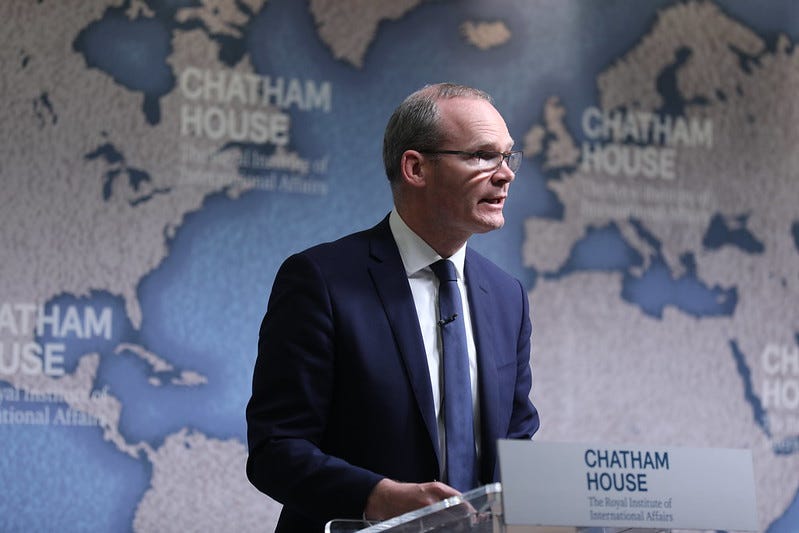Europe faces hard road to climate goals as Germany takes charge
A busy August that included a 'Golfgate' Covid-19 scandal has shaken the EU ahead of rough talks to meet climate targets

Above, Irish Foreign Minister Simon Coveney. Photo: Chatham House.
(Stephen Rae is the former Group Chief Editor of INM, Ireland’s largest online and print media group. He serves on the board of the World Association of News Publishers (WAN-IFRA) and was previously on the board of the World Editors Forum. He was appointed by the European Commission to its High Level Expert Group on Online Disinformation.)
DUBLIN (Callaway Climate Insights) — It’s been an August like no other in Europe with political machinations over the past week to match those in Washington, D.C.
The European Commission lost its heavyweight Trade Commissioner Phil Hogan, who resigned Wednesday night over the so-called “Golfgate” saga, after breaching quarantine guidelines in Ireland on returning from Brussels.
The matter, which had already claimed a government minister and deputy leader of the senate in Dublin, didn’t impress European Commissioner President Ursula von der Leyen. After a week of drip-feed claims and counterclaims, Hogan tendered his resignation yesterday to von der Leyen at her 13th floor office in the Berlaymont in Brussels. Hogan has been a giant on the world stage, forging a EU-Japan trade deal and the U.S. soybeans deal. He was also central to Brexit negotiations and enjoyed a good relationship with U.S. Trade Representative Robert Lighthizer.
The likely successor in the Commission is Irish Foreign Minister Simon Coveney, but there is no guarantee he will get the trade role.
Hogan is probably destined for the boardroom, but von der Leyen has shown a steel for her College of Commissioners, which predecessor Jean Claude Juncker hid from the public eye in his internal dealings. Even her laconic tweet wishing Hogan well didn’t go down well in the bars around Schuman and Place du Luxembourg.
Berlin is the de facto capital of the European Union (don’t tell Paris) and for the next six months it is the de jure capital, too. Germany currently holds the rotating Presidency of the European Council.
That means that Finance Minister Olaf Scholz is the main politician trying to get the massive €673 billion pandemic rescue deal through the European Parliament. Of course he also is the person trying to clean up the Wirecard scandal which took place on his watch — and to who all the failing watchdog agencies should have reported.
Separately, he is running the campaign to replace Chancellor Angela Merkel. Scholz will lead the Social Democrats (SPD) into the campaign for federal elections in 2021 and will try to beat Greens for the No. 2 position, behind the Christian Democrats (CDU/CSU).
The former mayor of Hamburg has not yet distinguished himself as a great pioneer of environmental protection. Matthias Miersch, deputy chair of the SPD parliamentary group for the environment and nature conservation, says there are many debates on how to bridge the gap between climate and social justice.
This became clear with the recent scrapping of premiums for combustion cars in the coronavirus stimulus package, which the party surprisingly rejected this time in a paradigm shift, says Kai Niebert, president of the German Nature Conservation Ring. Last year there was also supposedly fierce internal debate on the climate package, in which the SPD demanded a CO₂ tax, but was unable to get its way.
Either way, the SPD will have to put its green credentials on display in 2021 and balance them with their budgetary prudence credentials if Scholz is to take the prized chancellorship when Merkel departs the stage.
The EU could meet a stretchier medium-term carbon reduction goal, new research confirms — but it would mean slow-paced reform in Eastern Europe would have to sprint faster. And that is a hard ask.
Right now the European Commission is grasping with whether to deliver 50% or 55% cuts in greenhouse gas emissions by 2030. Research out of Germany says the higher 55% is both technically and economically possible.
The European Commission will later this month finally decide which goal it will reach for. The target must also align with planned EU reforms on tax, energy policy and the carbon market in 2021.
“Achieving a 55% target is possible,” said Germany-based think tank Agora Energiewende Executive Director Patrick Graichen. “And if it is feasible, why wouldn’t we go for it?”
To deliver the 55% target emissions under the Emissions Trading System (ETS) must fall to 61% below 2005 levels, deeper than the 43% reduction the carbon market is designed to deliver by 2030.
But EU countries which must approve the new climate target are divided. Western and Nordic countries back the more ambitious level while their eastern neighbors are very reluctant to consider bigger cuts before a costs assessment.
The researchers said there is “no credible pathway” toward a 55% target for 2030 without a bigger contribution from states such as Poland and Czech Republic.
Easier said than done.

